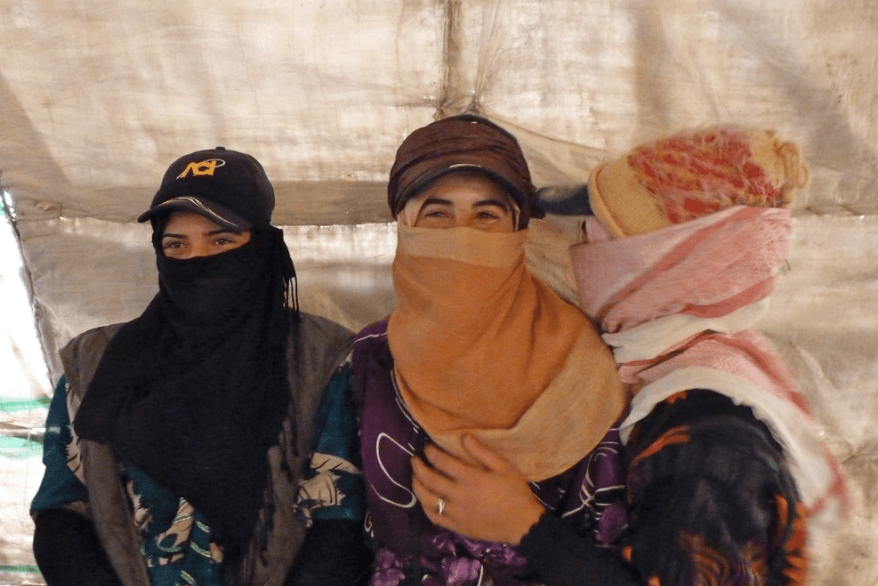Jordan struggling as Syrian refugees stream across the border
These three Syrian teenagers say they’re happy to be living in Jordan right now, even if as refugees. But, the girls all say they want to go back to Syria as soon as possible. (Photo by Matthew Bell.)
At an aid center in Ramtha on the northern Jordanian frontier, just across from Daraa, Syrian refugees line up for boxes of rice, sugar and tea. Daraa is where the 14-month Syrian uprising began.
Mohammed Ahmed Iyad of the aid group Kitab and Sunna, said the group is struggling to provide accommodation.
“Frankly, Ramtha is full to capacity,” he said. “There are very few available apartments now, so we must house three families together in one.”
Housing isn’t the only problem. Jordan and the United Nations High Commissioner for Refugees, the United Nations refugee agency, are loathe to open up a new camp, even though one has already been set up. Jordan doesn’t want to further damage already strained ties with Syria, and the UN has said it’s hard to get people to move home once a camp is opened.
So for the moment, Jordan has opened its public schools to educate refugee children and its state hospitals to care for wounded and ill refugees.
But for one of the world’s ten driest countries, the real challenge is getting everyone enough water. The infrastructure can’t keep up with the need. Jordan can only pipe out water once a week to fill storage tanks on people’s roofs. If the power goes out or pumps are damaged, then not a drop flows. If you use up all the water in the tank before it’s refilled, you pay for a water truck to fill it back up. That’s something neither refugees nor poor Jordanians can afford to do.
Riyadh Farid runs a gas station and car wash in Amman. He said he never has enough water at work or at home.
“I always have to buy extra water from the water tankers. Water that comes from the government supplies is never enough. Of course with Syrian and Iraqi refugees flooding in and Gulf Arabs coming for their summer vacations, this only puts more pressure on our system,” Farid complained.
Faird alluded to another problem as well: the annual summer influx of tourists.
“Already there are huge traffic jams. We’re being invaded by Gulf Arabs even more so now with the problems in Syria, Egypt and Libya,” said taxi driver Hussein Nour Al-Abed.
Al-Abed spends his day driving the hilly streets of Amman and normally he likes nothing better. But he’s dreading this summer.
“They’re not going to those hot spots,” he said. “Our streets are clogged and rents are going through the roof. Just wait, food, drink and transportation prices are going to be hiked too.”
Hotel clerk Ahmed Najjar said it’s tough to see Arabs from the Gulf flinging money around when Arab refugees and impoverished Jordanians are suffering.
The UN refugee agency representative to Jordan, Andrew Harper said the international community must do a lot more to help Jordan and its people bear the burden.
“It’s easy for the international community to be talking big about Syria,” Harper said, “but what we actually need to see is a lot more support to the agencies working on the ground to provide protection and assistance to Syrians, but also to the Jordanian government and the communities.”
But Harper said given the worldwide interest in the Arab democracy movements over the past year, money to help refugees hasn’t materialized, especially in Jordan. The U.N. appeal to raise $84 million for Syrian refugees, for example, hasn’t been met in the two months since it was launched. And if money isn’t forthcoming, Jordanians and the Arabs they’re hosting are going to be facing an especially long, hot summer.
